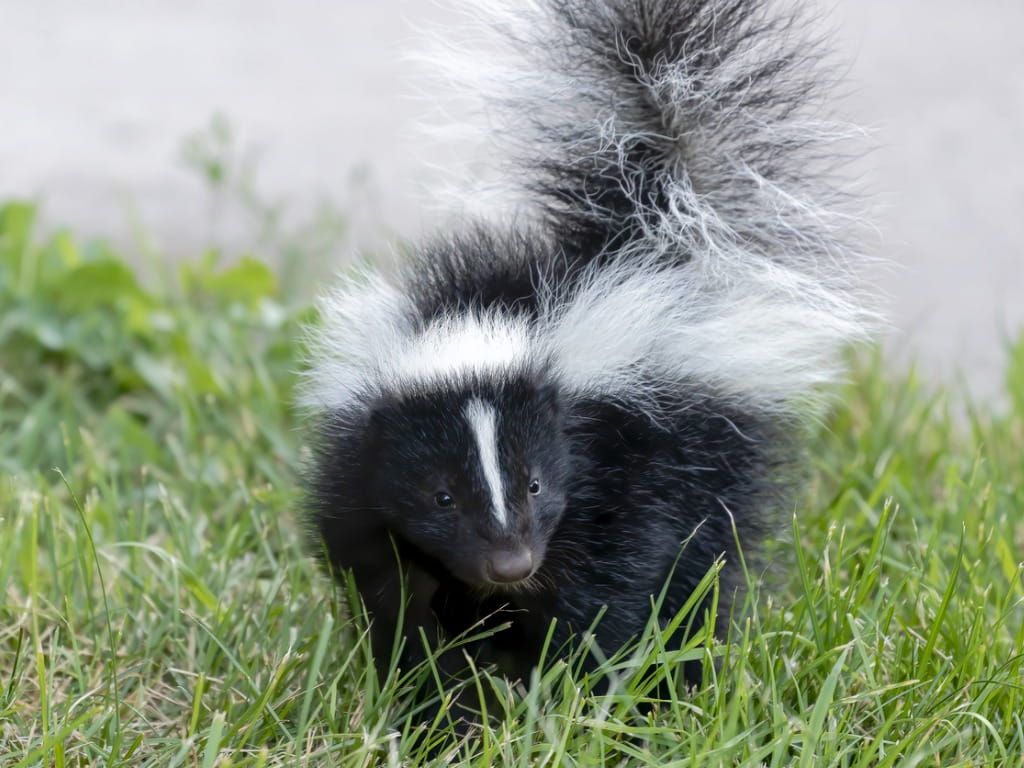What Happens If A Skunk Sprays Me?

The Bottom Line
Skunks spray to repel potential predators with a foul-smelling, oily secretion stored in their perianal glands. For humans, it usually does not result in much more than short-term irritation. In dogs, in addition to irritation it can rarely cause a more serious condition in which the red blood cells are destroyed. Leaving skunks (as well as all wildlife) alone and making your home less attractive and inaccessible to them are the keys to prevention.

If there is one constant in nature, it’s the evolutionary arms race between prey and predator. While some prey defend themselves by biting, stinging, camouflaging, trickery, or envenomation, skunks are equipped with a unique weapon—a pair of perianal sacs that secrete a smelly, oily liquid. They use this foul-smelling secretion to keep their predators at bay. But is there more to skunk spray (also referred to as skunk essence or skunk musk) than just being smelly? What’s in it, exactly? Is it harmful to humans and animals?
What is skunk spray?
Skunk spray is a yellow oil that is volatile, which means it easily evaporates and becomes a gas. Skunk spray is made of organic sulfur-containing thiols, which are responsible for its characteristic odor. Sulfur has an odor often described as spoiled cabbage or rotten eggs. Good examples of thiols are mercaptans, which are added to the otherwise odorless natural gas supplied by your utility company. The odor warns you that gas might be leaking into your home.
Despite its small size, a skunk can eject up to 5 mL of this oil per gland (so up to a total of 10 mL, which is 2 teaspoonfuls) at their target and for up to an impressive 20 feet with excellent aim. When in the air, the odor is detectable at concentrations as low as only about 1 part per billion (ppb). This is the equivalent of one sheet in a roll of toilet paper stretching from New York to London.
Can skunk spray hurt me or my pet?
When people are exposed, particularly if sprayed into the eyes, it can cause short-term stinging, burning, redness, and tearing. This can make it difficult to open the eyes for a few minutes. Breathing it in can irritate the lungs. The odor has the potential to worsen asthma symptoms, but this is quite rare. The smell can be nauseating.
While skunk spray is best classified as an irritant, rare but important effects have been described in dogs. If your dog is sprayed in eyes or mouth, you might notice drooling, vomiting, red and swollen eyes, sneezing, and temporary blindness. A more serious syndrome, in which the skunk spray damages the red blood cells, has been described in dogs following heavy exposure, but it’s quite rare.
What should I do if I or my pet are exposed?
Decontamination is key. It not only removes the oil from wherever it was sprayed (e.g., skin, eyes, mouth) but will also help break it down and neutralize it so you don’t have to smell it anymore.
Whether on skin or fur, use the following recipe:
- 1 quart of 3% (household strength) hydrogen peroxide
- ¼ cup of baking soda
- 1 teaspoonful of liquid dish detergent
For it to be effective, this solution has to be used immediately after mixing. Apply for 5 minutes, then rinse; repeat as needed. The hydrogen peroxide acts as an oxidizing agent, changing the structure of the thiols into non-smelly compounds. The dish detergent cuts the oil and makes it easier to wash away. Do not apply this mixture to the eyes or mouth. Rinse eyes gently with room temperature water for 15 minutes. If in the mouth, rinse with water and spit.
For inanimate objects, use 1 cup of bleach in a gallon of water. Wash contaminated clothing with heavy-duty laundry detergent or borax. There are also several commercial products available for purchase.
Don’t underestimate the power of fresh air—when indoors, open some windows to let fresh air in and ventilate the space.
Does tomato juice work?
No, it has not been proven to work. The myth might have been perpetuated by a phenomenon known as olfactory fatigue. Olfactory fatigue is when your nose simply adapts to the constant presence of a particular odor and stops smelling it.
When should I seek medical care?
Check the webPOISONCONTROL® online tool or call Poison Control at 1-800-222-1222 for guidance. As a general rule, you should seek medical evaluation if you’re having severe or persistent symptoms of irritation. For instance, if you’re having persistent pain, discomfort, or redness in your eyes even after rinsing with water or if you’re experiencing persistent respiratory symptoms like coughing.
If your dog or cat is sprayed directly in the eyes, consult your veterinarian promptly. The ASPCA also recommends taking your pet to a veterinarian right away if symptoms such as lethargy, weakness, or a change in urine color occurs or if you notice pale or brown gums a few hours or days following exposure.
Is there risk for rabies from skunk spray?
In the US, skunks can carry rabies. However, it is not transmitted through contact with their anal gland secretions. It’s transmitted by saliva or by the bite of an infected skunk. Rabies is deadly. If you or your pet have been bitten by a skunk or if you are concerned about exposure to its saliva, seek immediate medical evaluation and treatment.
Do skunks always spray when threatened?
No, skunks do not always spray when they feel threatened. They typically show warning signs first, like raising their tail, stomping their feet, and hissing or charging if their striped appearance isn’t warning enough. They only spray if these initial warnings are ineffective. This is because one spray depletes their life-saving defense and refilling the glands can take up to 10 days.
What can I do to prevent exposure to skunk spray?
Skunks are usually nocturnal, which means they are most active at night. They are sensitive to light. Having a motion-sensing light outside your home might scare them away. They also like to make homes under decks or porches or near brush or wood piles. Block access to or remove these. Leave wildlife alone and teach children to do the same. There are actions you can take to prevent skunks from finding shelter and food near your home. We recommend following the Centers for Disease Control and Prevention’s (CDC) prevention tips to protect your family, pets, and home from wildlife.
If you or your pet have been sprayed by a skunk, use the webPOISONCONTROL® online tool or call 1-800-222-1222.
Serkalem Mekonnen, RN, BSN, MPH
Certified Specialist in Poison Information
Poisoned?
Call 1-800-222-1222 or
Prevention Tips
This Really Happened
A 40-year-old man was mowing his lawn when he was sprayed by a skunk. Some of the spray went into his eyes. He experienced eye irritation and called Poison Control for advice. He had already started rinsing using a nearby water hose. Poison Control advised continuing to rinse gently with water for 15 minutes and then to seek medical evaluation if the irritation persisted or if any other symptoms such as swelling of the eyes occurred. Poison Control contacted the man the following day, by which time he was symptom-free and said that he did not have to be seen by a healthcare professional.
For More Information
Britannica, The Editors of Encyclopaedia. Thiol. Encyclopaedia Britannica [cited 2021 17 Sep].
Skunk spray toxicosis: An odiferous tale. DVM360; 2013 Apr 1 [cited 2021 Sep 17].
University at Albany. Understanding sulfur's rotten smell. Phys.org; 2016 [cited 2021 17 Sep].
Williams K, Yuill C. Skunk spray and your dog. Los Angeles: VCA Hospitals; 2021 [cited 2021 Aug 26].
References
Wood WF. The history of skunk defensive secretion research. Chem Educator. 1999;4:44–50.
Poisoned?
Call 1-800-222-1222 or
Prevention Tips
This Really Happened
A 40-year-old man was mowing his lawn when he was sprayed by a skunk. Some of the spray went into his eyes. He experienced eye irritation and called Poison Control for advice. He had already started rinsing using a nearby water hose. Poison Control advised continuing to rinse gently with water for 15 minutes and then to seek medical evaluation if the irritation persisted or if any other symptoms such as swelling of the eyes occurred. Poison Control contacted the man the following day, by which time he was symptom-free and said that he did not have to be seen by a healthcare professional.
